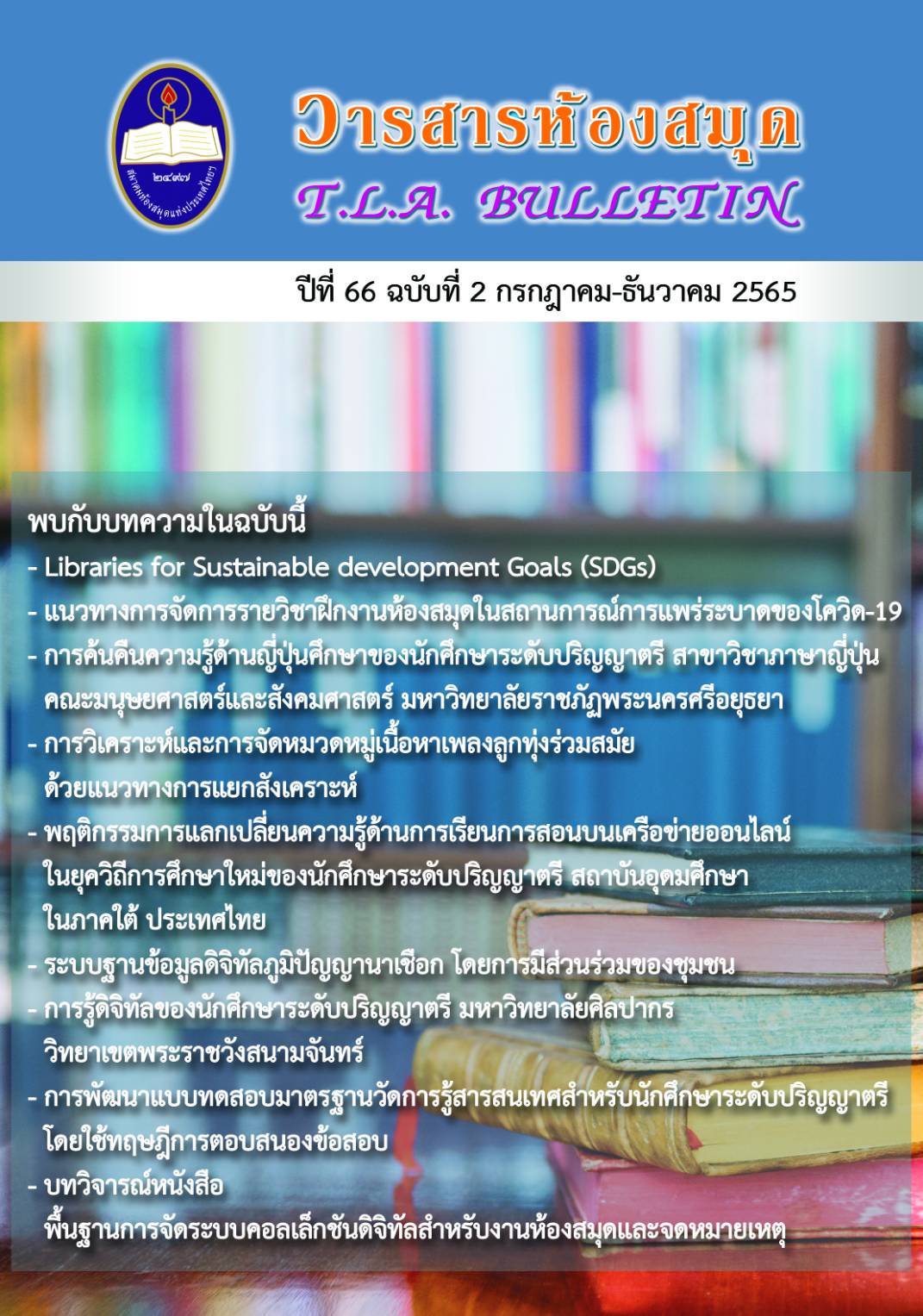การรู้ดิจิทัลของนักศึกษาระดับปริญญาตรี มหาวิทยาลัยศิลปากร วิทยาเขตพระราชวังสนามจันทร์
คำสำคัญ:
การรู้ดิจิทัล, นักศึกษาระดับปริญญาตรีบทคัดย่อ
บทความวิจัยนี้มีวัตถุประสงค์เพื่อศึกษาระดับการรู้ดิจิทัลของนักศึกษาระดับปริญญาตรี มหาวิทยาลัยศิลปากร วิทยาเขตพระราชวังสนามจันทร์ในด้านความรู้ความเข้าใจสารสนเทศดิจิทัล ด้านการเข้าถึงและการค้นหาสารสนเทศดิจิทัล ด้านการสร้างสารสนเทศดิจิทัล และด้านการใช้สารสนเทศดิจิทัล กลุ่มตัวอย่างที่ใช้ในการวิจัย คือ นักศึกษาระดับปริญญาตรี มหาวิทยาลัยศิลปากร วิทยาเขตพระราชวังสนามจันทร์ ที่ลงทะเบียนเรียนปีการศึกษา 2563 มีทั้งหมด 5 คณะ จำนวน 373 คน เก็บข้อมูลโดยใช้แบบสอบถาม สถิติที่ใช้ คือ ค่าร้อยละ ค่าเฉลี่ย และส่วนเบี่ยงเบนมาตรฐาน
ผลการวิจัยพบว่านักศึกษาระดับปริญญาตรี มหาวิทยาลัยศิลปากร วิทยาเขตพระราชวังสนามจันทร์มีระดับการรู้ดิจิทัลโดยภาพรวมอยู่ในระดับมาก ( x̅ = 4.11) โดยด้านความรู้ความเข้าใจสารสนเทศดิจิทัลมีระดับการรู้ดิจิทัลมากที่สุด ( x̅ = 4.22) รองลงมา คือ ด้านการใช้สารสนเทศดิจิทัล ( x̅ = 4.18) ด้านการเข้าถึงและการค้นหาสารสนเทศดิจิทัล ( x̅ = 4.05) และด้านการสร้างสารสนเทศดิจิทัลซึ่งมีค่าเฉลี่ยน้อยที่สุดกว่าด้านอื่นๆ ( x̅ = 3.98) เมื่อพิจารณาเป็นรายด้านพบว่า ด้านความรู้ความเข้าใจสารสนเทศดิจิทัล ข้อที่มีค่าเฉลี่ยสูงสุด คือ มีความระมัดระวังในการเชื่อข่าวสารที่ได้รับจากสื่อสังคมออนไลน์( x̅ = 4.42) ด้านการเข้าถึงและการค้นหาสารสนเทศดิจิทัล ข้อที่มีค่าเฉลี่ยสูงสุด คือ สามารถใช้เครื่องมือออนไลน์และเว็บไซต์ เพื่อค้นหาและบันทึกข้อมูลได้ ( x̅ = 4.31) ด้านการใช้สารสนเทศดิจิทัล ข้อที่มีค่าเฉลี่ยสูงสุด คือ รับรู้เรื่องลิขสิทธิ์โดยไม่นำผลงานของผู้อื่นจากเว็บไซต์มาเป็นของตนเอง(x̅ = 4.34) และด้านการสร้างสารสนเทศดิจิทัล ข้อที่มีค่าเฉลี่ยสูงสุด คือ นำเสนอรายงานในชั้นเรียนด้วยสื่อประสม เช่น สไลด์ Power point, วีดิทัศน์ได้ ( x̅ = 4.31)
Downloads
เอกสารอ้างอิง
Anutkun, S. (2022). Understanding and using digital technology. Retrieved July 19, 2022, from https://erp.mju.ac.th/acticleDetail.aspx?qid=1246
Bunyu, A. (2020). Things to know about digital literacy. Retrieved July 19, 2022, from http://lib3.dss.go.th/fulltext/dss_j/2561_66_207_P28-29.pdf [In Thai]
Chongsoemtrakoon, S. (2013). A group learning system based on open educational resources to promote digital information literacy and information ethical awareness among education students (Master’s thesis, Chulalongkorn University, Thailand). [In Thai]
Chuenchom, S ; Jairak, K & Kowan, U. (2021). A model for developing digital literacy skills of university students Chiang Mai Rajabhat to improve learning quality. Journal of Information Science, 39(2), 16-33. [In Thai]
Chutrakoon, S. (2016). Families with digital media literacy of the digital native. Journal of Management Science Chiang Rai Rajabhat University, 11(1), 131-150. [In Thai]
Kasinan, J. (2016). Effects of using interactive e-learning lessons to promote information literacy digital for students Faculty of Education Thaksin University. Golden Teak : Journal of Humanities and Social Sciences, 22(2), 12-24. [In Thai]
Kim, K. T. (2019). The Structural Relationship among Digital Literacy, Learning Strategies, and Core Competencies among South Korean College Students. Retrieved July 19, 2022, from http://eds.b.ebscohost.com/eds/pdfviewer/pdfviewer?vid=2&sid=ce32a2c7-2bc8-4647-ad90-9e350632d428%40pdc-v-sessmgr02
Martin, A. (2008). Digital literacy and the Digital society. (p.151-175). In Lankshear, C., & Knobel, M. (Eds.) Digital literacies : Concepts, policies and practices. New York: Lang Pub.
Ministry of Digital Economy and Society. (2019). National policies and plans on Digital Development for Economy and Society (2018 – 2037). Retrieved July 19, 2022, from http://www.ratchakitcha.soc.go.th/DATA/PDF/2562/A/047/T_0001.PDF[In Thai]
National Science and Technology Development Agency.(2019). Digital Literacy. Retrieved July 19, 2022, from https://www.nstda.or.th/th/nstda-knowledge/142-knowledges/2632 [In Thai]
Office of Basic Education Committee of the Ministry of Education.(2010). International Digital Learning Technology School Standard. Bangkok : Agricultural Cooperative Association of Thailand Printing House. [In Thai]
Ozdamar-Keskin, N ; Ozata, Z ; Banar, K & Royle, K. (2015). Examining Digital Literacy Competences and Learning Habits of Open and Distance Learners. Retrieved July 19, 2022, from https://www.researchgate.net/publication/339280638_Examining_Digital_Literacy_Competences_and_Learning_Habits_of_Open_and_Distance_Learners
Permpoonwiwat, S ; Mansap,S & Kaewmano, J. (2021). Citizenship : Citizenship Status Survey with digital literacy. Retrieved July 19, 2022, from https://www.kpi.ac.th/knowledge/research/data/1194?page=3[In Thai]
Pibulmanee, S. (2017). Librarian Space: Digital Literacy. Retrieved July 19, 2022, from http://km.li.mahidol.ac.th/librarian-space-digital-literacy/
Saechan, Thida & Moson,Tassanee.(2016). Digital Literacy: Definition, Composition, and Current Situation. Journal of Information Science 4, 34 : 116-145. [In Thai]
Saechan, T & Moson, T. (2016). Digital Literacy: Definition, Composition, and Current Situation. Journal of Infrormation Science, 4(34), 116-145.[In Thai]
Silpakorn University Council. (2019). Silpakorn University Development Plan, 5-year period 2019-2023. Retrieved July 19, 2022, from http://www.plan.su.ac.th/Document/5YearPlan/[In Thai]
Techathawiwan,W & Prasertsin, U. (2016a). Report on the Development of Digital Literacy Measure for Undergraduate Students. Bangkok : Department of Library and Information Science Faculty of Humanities Srinakharinwirot University. [In Thai]
Techathawiwan,W & Prasertsin, U. (2016b). Digital Literacy Assessment of Undergraduate Students in Bangkok Metropolitan Region. Journal of Information Science, 34(4), 1-28. [In Thai]
The Open University. (2012). Being digital : Digital literacy skills checklist. Retrieved from http://www.open.ac.uk/libraryservices/beingdigital/accessible/accessible-pdf-35-self-assessment-checklist.pdf
Thong-iam, B.(2018). Developing indicators for digital literacy skills of teaching professional students in the university without limitation. Academic Journal of Suvarnabhumi Institute of Technology 4(1), 291-302. [In Thai]
Ting, Y.L. (2015). Tapping into students' digital literacy and designing negotiated learning to promote learner autonomy. The Internet and Higher Education, 26, 25-32.
Wongkitrungreng, W & Chittarerg, A. (2011). New Future Skills: Education for the 21st Century. Bangkok: Openworld. [In Thai]
Wongyai, N. (2017). Digital Literacy Development Approach of Digital Native. Retrieved July 19, 2022, from https://www.tci-thaijo.org/index.php/Veridian-E-Journal/article/view/99734/77505 [In Thai]
ดาวน์โหลด
เผยแพร่แล้ว
รูปแบบการอ้างอิง
ฉบับ
ประเภทบทความ
สัญญาอนุญาต
ลิขสิทธิ์ (c) 2022 วารสารห้องสมุด สมาคมห้องสมุดแห่งประเทศไทยฯ

อนุญาตภายใต้เงื่อนไข Creative Commons Attribution-NonCommercial-NoDerivatives 4.0 International License.




